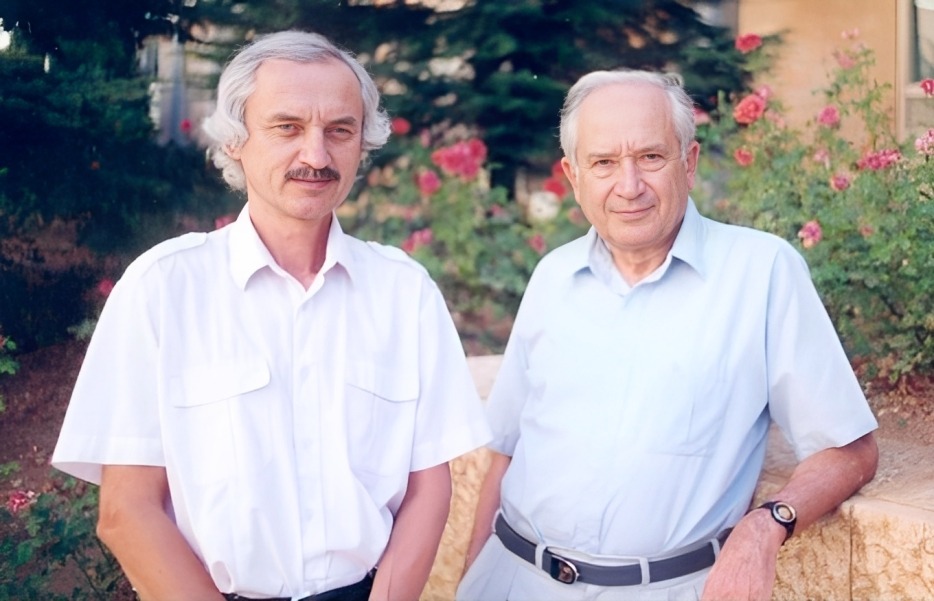The famous cannabis scientist Raphael Mechoulam passed away at the age of 92. The news was announced by friends and colleagues who shared their condolences and tributes. Among his many accomplishments, Dr. Mechoulam is considered the first person to isolate and then synthesize THC. Most recently, at CannMed 2019, the then-88-year-old announced the discovery of CBDA, suitable for clinical use.
Raphael Mechoulam, “Father of Cannabis Research,” Dies at Age 92


The famous cannabis scientist Raphael Mechoulam passed away at the age of 92. The news was announced by friends and colleagues who shared their condolences and tributes.
For more news like this, download our free cannabis news app.
Eulogizing Mechoulam
“This is a very sad day for me, for the scientific community, and for the cannabis community. Professor Raphael Mechoulam, whom we called Raphi, was one of the greatest scientists I have ever met, my teacher and mentor in many ways. I truly believe he deserved a Nobel Prize!” shared David Meiri, associate professor at the Technion – Israel Institute of Technology and colleague of Mechoulam.
“Thank you, Raphi, for all the great things you did and discovered in your life, and thank you for all the help and support you gave me. Rest in peace, my dear friend.”
The Father of Cannabis Research
Among his many accomplishments, Dr. Mechoulam is considered the first person to isolate and then synthesize THC.
Raphael Mechoulam was born in 1930 in Sofia, Bulgaria. His family later moved to Israel, where Mechoulam studied chemistry.
In the early 1960s, while working as a chemist at the Weizmann Institute, Mechoulam procured cannabis from the Israeli police with the intention of isolating and identifying the plant’s psychotropic component, which had never been done at the time.
“Morphine had been isolated from opium in the 19th century, early 19th century,” Mechoulam said in a 2014 interview with CNN. “Cocaine had been isolated from coca leaves [in] the mid-19th century. And here we are in the middle of the 20th century when the chemistry of cannabis is not yet known. So it was an interesting project.
Mechoulam Discovers THC
Mechoulam succeeded in his cannabis project, and discovered tetrahydrocannabinol (THC). He and his colleagues also isolated, discovered the molecular structure, and synthesized several other cannabinoids, including cannabidiol (CBD), cannabigerol (CBG), and cannabichromene (CBC).
The discoveries of Mechoulam laid the foundation for chemical research on cannabis and helped spur new discoveries, such as the body’s cannabinoid receptors in the 1980s and 1990s.
Once these endocannabinoid receptors were identified, the race was on to find the chemicals that normally interact with them, the body’s endogenous cannabinoids. Once again, Mechoulam proved to be a pioneer. In 1992, he conducted research that proved that a chemical called arachidonoyl ethanolamine, which he and his colleagues named anandamide, was produced by the body and could activate the CB1 receptor.
Mechoulam Continued His Research and Innovations in Old Age
At the 2019 CannMed cannabis conference in California, the then-88-year-old researcher announced another creation: synthetically stable Cannabidiolic Acid (CBDA), suitable for clinical use.
“We have taken the unstable acid molecules of the cannabis plant and synthesized them to provide a stable and consistent basis for the search for new therapies across a wide range of medical needs,” Mechoulam explained during his presentation at the conference.
We Need More Cannabis Research
In his speech, Mechoulam urged the scientific community to further support medical cannabis research and lamented the research time already lost, as well as the patients who have been unable to benefit from cannabis-based treatments for conditions such as epilepsy.
“Did we have to wait 30 years? No,” said Mechoulam in 2019. “We could have helped thousands of children, and we didn’t.”
Mechoulam was a professor of medicinal chemistry at the Hebrew University of Jerusalem in Israel. He received the Israeli Exact Science Prize – Chemistry in 2000, a NIDA Discovery Award in 2011, and the Harvey Prize (an annual Israeli award for breakthroughs in science and technology) in 2019.
—
(Featured image via Wikimedia Commons – Public Domain)
DISCLAIMER: This article was written by a third-party contributor and does not reflect the opinion of Hemp.im, its management, staff, or its associates. Please review our disclaimer for more information.
This article may include forward-looking statements. These forward-looking statements generally are identified by the words “believe,” “project,” “estimate,” “become,” “plan,” “will,” and similar expressions. These forward-looking statements involve known and unknown risks as well as uncertainties, including those discussed in the following cautionary statements and elsewhere in this article and on this site. Although the company may believe that its expectations are based on reasonable assumptions, the actual results that the company may achieve may differ materially from any forward-looking statements, which reflect the opinions of the management of the company only as of the date hereof. Additionally, please make sure to read these important disclosures.
First published in Newsweed, a third-party contributor translated and adapted the article from the original. In case of discrepancy, the original will prevail.
Although we made reasonable efforts to provide accurate translations, some parts may be incorrect. Hemp.im assumes no responsibility for errors, omissions or ambiguities in the translations provided on this website. Any person or entity relying on translated content does so at their own risk. Hemp.im is not responsible for losses caused by such reliance on the accuracy or reliability of translated information. If you wish to report an error or inaccuracy in the translation, we encourage you to contact us.



Comments are closed for this post.